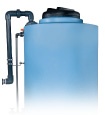How to Dispose of a Chemical Storage Tank Safely
.jpg?width=1200&height=630&name=How%20to%20Dispose%20of%20a%20Chemical%20Storage%20Tank%20Safely%20(1).jpg)
Customers often ask us how to safely dispose of a chemical storage tank once it has reached the end of its useful life. Although Poly Processing doesn’t offer tank decommissioning services, we can offer you guidance for proper chemical tank disposal.
Hazardous waste is an escalating global issue, increasing every year in production and in the challenges associated with its storage and disposal. This has led to the development of a specialized industry regulated by the Environmental Protection Agency (EPA).
Here is the fundamental information you need to know before you haul away your polyethylene chemical storage tank.
Your Tank Is Hazardous Waste
Hazardous waste encompasses a wide range of materials, including the tanks that store hazardous chemicals. Because chemicals in most cases, eventually permeate all plastics, your polyethylene chemical storage tank becomes hazardous waste — whether your tank is crosslinked or linear polyethylene. 
Safe disposal of hazardous waste materials involves collecting, removing, and then remediating the waste. Remediation can involve transforming the waste into a safe product via treatment, isolation, or recycling. They should not be discarded in regular landfills. The goal is to neutralize the hazardous waste and prevent it from degrading and contaminating the environment.
Most states have a “Cradle to Grave” law, which applies to used chemical storage containers and hazardous waste. The law states that once you put a chemical into a tank, you, as the tank owner, are responsible for that tank forever—no matter what happens to the tank. This includes the generation, transportation, treatment, storage, and disposal of hazardous waste.
Remember, this notion still holds true even after the tank is retired from use.
Legally Disposing of Your Chemical Tank
 In most cases, you can’t simply cut up a tank and put it in a landfill. Instead, we recommend that you contact your local, state, or federal OSHA or EPA office to get instructions on how to dispose of your tank. The instructions can be specific to the tank and the chemical being stored, so you will probably need to contact the regulatory office each time you need to dispose of a tank.
In most cases, you can’t simply cut up a tank and put it in a landfill. Instead, we recommend that you contact your local, state, or federal OSHA or EPA office to get instructions on how to dispose of your tank. The instructions can be specific to the tank and the chemical being stored, so you will probably need to contact the regulatory office each time you need to dispose of a tank.
When contacting OSHA or the EPA, be prepared to give them the chemical name and tell them how clean the tank is. Unless your tank is completely chemical-free, it will most likely be considered as hazardous waste. The regulatory office will determine whether the tank needs to go to a standard landfill, hazardous waste landfill, or possibly can be recycled.
Hauling the Chemical Tank
Prior to moving the tank, contact the landfill to discuss specific handling requirements. Many landfills won’t accept storage tanks unless they have been cut up, so it is better to know the specific requirements in advance.
In almost all cases, tanks and containers must be emptied of chemicals and sludge before disposal or recycling, and they must be cleaned to a vapor-free condition. We recommend hiring a professional hazardous waste disposal company to disinfect, cut up, and haul off your tank.
There are several of these companies throughout the United States that are equipped to provide expert hauling and disposal services. These companies will come out to your site to clean the tank, handle any remaining chemical, and may provide a temporary rental tank if needed. Often, your OSHA or EPA office can recommend a local company.
Dispose of Your Tank with Confidence
When it comes time to retire your chemical storage tank, be sure you know what your local and state laws require. Follow these guidelines to ensure that you handle tank disposal ethically and legally.
Have questions about proper chemical tank disposal? Contact a Poly Processing chemical storage tank expert today.
- January 15, 2024
- Topics: Tank Design and Materials, FAQs
About Poly Processing
Posts By Topic
Tech Talk Podcast Episodes
Subscribe By Email
Recent Posts
- Ferric Chloride Storage: What Operators Need to Know Before Choosing a Tank
- Wastewater Treatment: Modern Approaches to Sludge Removal & Chemical Management
- Why Cycling Causes Tank Failure: Tips for Prolonging Tank Life
- Small Changes in Tank Selection for Big Long-Term Cost Benefits
- NSF Certification vs. FDA Compliance: Understanding Chemical Tank Standards
Tank Configurator

Find the recommended tank and system components for your chemical storage challenge.
Configure a Tank Package




